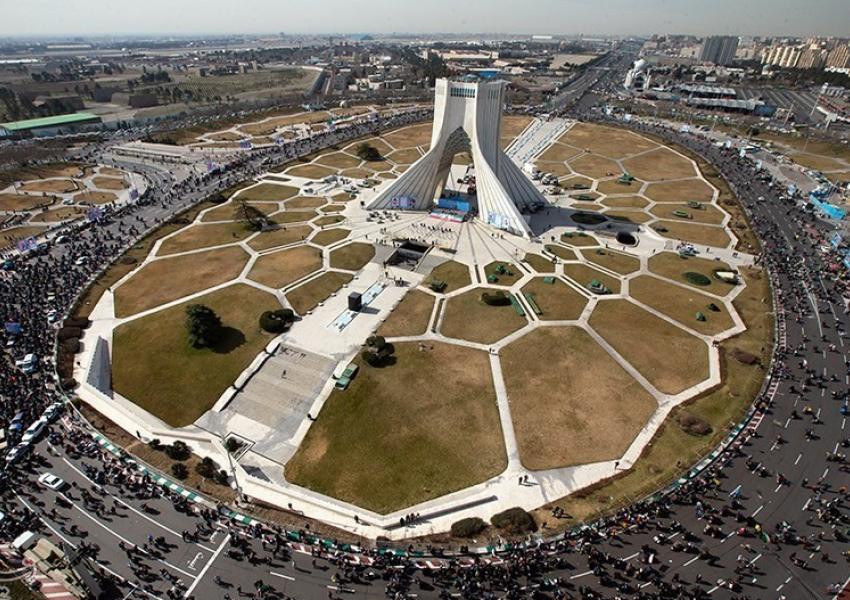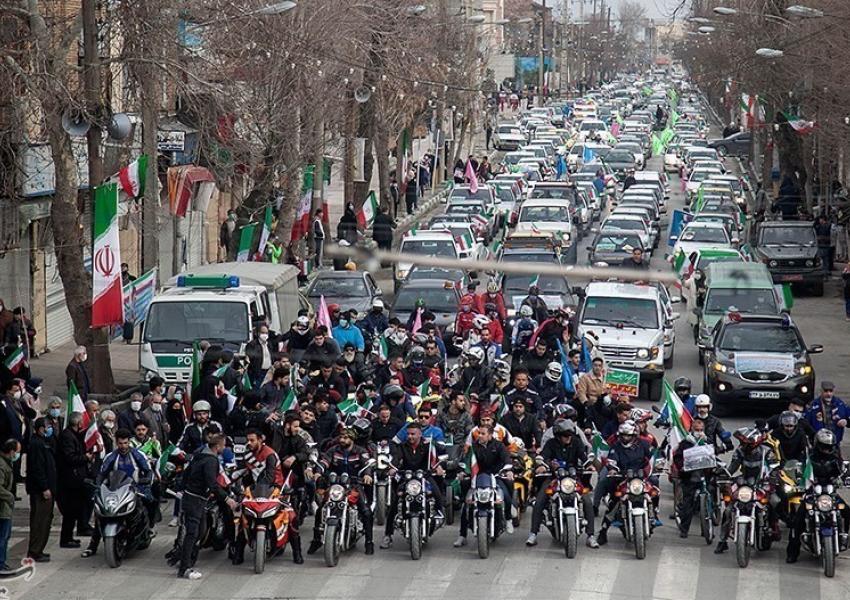
Iran’s Rouhani Speaks of Negotiations, As Missiles Are Unveiled For Revolution Anniversary
Iranian Revolutionary Guards (IRGC) on Wednesday [February 10] paraded three ballistic missiles at Tehran’s Azadi (Freedom) Square where the anniversary of the 1979 Revolution is annually marked with fanfare and a large rally.
With the Covid-19 pandemic, people from across the country were allowed to participate only if they came on wheels – creating cavalcades of cars and bikes.
At the same time, President Hassan Rouhani spoke of being proud of choosing the path of negotiation and seeking “peace treaties.”
In the customary presidential speech, delivered from his office and broadcast on television, Rouhani said that United States President Donald Trump had forsaken an “effortless and costless” victory by in 2018 abandoning Iran’s 2015 nuclear agreement with world powers. Both Rouhani and President Joe Biden have expressed a desire to revive the agreement.
“Negotiating is not a negative thing, it’s one of the requisites of a modern government and governance in a modern world,” Rouhani argued, thereby defending his record against opponents of the 2015 deal. The president added examples of negotiations between the Prophet Mohammad and his enemies, and of a peace treaty Mohammad reached. Rouhani said his government was proud to have learned both from the prophet and from Imam Hassan, the second Imam of Shiite Muslims, who also signed peace treaties with previous enemies.
A different note was struck in the concluding statement of the Revolution celebrations, which is always issued by the Islamic Development Coordination Council, whose head is appointed by Supreme Leader Ali Khamenei. It spoke of jihad (holy war) and defeating the enemy, and quoted Khamenei’s advice on “not investing hopes in the enemy or being intimated by them.”

“We consider investment of hopes in the enemy and being intimidated by them a massive and unforgivable mistake,” the statement said. “We advise the authorities of the country to abide by…[the leader’s] important and decisive decree and will not tolerate any languor or passivity against the enemy in political, economic and international arenas.”
The three missiles put on show by the IRGC Aerospace Force were Zolfaghar-e Basir Dezful and Ghiam (Qiam). Zolfaghar-e Basir, the latest model of Zolfaghar class missiles, has a 700km range, is equipped with an optic warhead, and can target vessels at sea. Dezful, a model of the same class, has a 1,000km range and is a surface-to-surface missile – the kind used on January 8, 2020 to hit Ain al-Assad, the US airbase in Iraq, after a US drone strike killed Iran’s Quds Force commander Qasem Soleimani and nine others in Baghdad. The Ghiam has an 800km range and a guided warhead.
At a press briefing on Tuesday, US State Department Spokesman Ned Price reiterated the Biden administration’s concern over Iran’s missile program, saying the US was employing various “non-proliferation tools” to prevent any advancement in Iran’s capabilities and had imposed sanctions against entities supporting Iran’s missile program. Price emphasized that Biden’s goal beyond reviving the 2015 nuclear deal was to reach follow-on agreements including missiles.
Hamed Esmaeilion, spokesman in Canada for families of the Ukrainian airliner shot down by an Iranian air-defense battery hours after the Ain al-Assad attack on January 8, 2020, said that those attending the Tehran rally were celebrating “the anniversary of your revolution on the blood that you have spilt.”
“We are fed-up with you and do not consider you human beings,” Esmaeilion wrote. This prompted Iranians on social media to repeat the hashtag ‘We are fed-up with you,’ including families of political prisoners and those executed, as well as activists, journalists, sports champions, and defenders of women’s rights.









